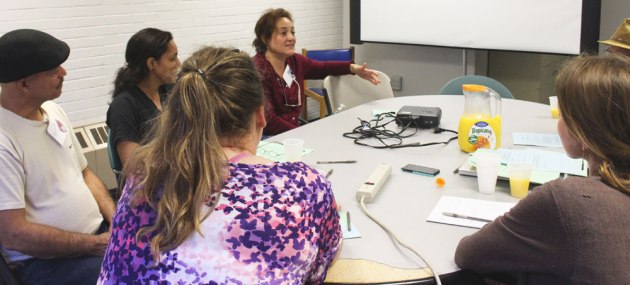This post was originally posted in the Ethnography Matters blog on July 15, 2013, by Ricarose Roque, a PhD student in Lifelong Kindergarten.
In designing our research projects, we weigh which methods can contribute (or not contribute) into our research questions, but how might these methods benefit the people we study?
I found a surprising outcome in a recent series of focus groups I conducted to understand parents’ perceptions of computing in their lives and their children’s lives. Parents play an important role in their children’s learning ecology, from encouraging their children at home to brokering relevant relationships and resources for children beyond the home. As technology proliferates to every part of our lives from how we connect with one another to how we can learn, I’ve been interested in how parents are negotiating technology use with their children, especially among parents who do not have a history or background in computing and engineering. (I use parents loosely here to mean any adult caretaker.) I used focus groups to interview multiple parents in a familiar setting (their local community center) and to leverage the dynamics of groups to gather shared perceptions or contentious points.
In the hour and a half we shared together, I would discuss with 3 to 5 parents their personal and children’s use of technology and its influence on their lives. And at the end of each one, I noticed that parents seemed to enjoy the experience. They thanked me for putting this together. And then they thanked each other. Some suggested doing “this” again. Parents exchanged contact information. There was a feeling that we went through something special. And I only made sense of what that was through iterative readings of the transcripts.
I found that parents connected over their sometimes overwhelming anxiety around computing and how it influenced how they saw themselves, their children, and their relationships to their children. For example, they agreed that there were benefits to using computers and mobile devices in their lives, but at the same time, they shared questions about what was being lost or given up with their use. With cell phones, they could get in touch with their children immediately and at any time. With Facebook, they could keep in touch with relatives still living in the countries they left behind. But when someone grows up with communication done through text-based mediums and interactions mediated through devices, how do they connect with people emotionally and deeply in real life? How do they develop their sense of what is right and wrong? One mother asked about technology: “How — not even how does it benefit him — how does it benefit other people? How does what you do [with technology] help someone else?”
For every question I asked, parents illuminated their responses with stories. One dad shared his disappointment with how technology has complicated reading with his son, and even replaced him as his son’s reading partner.
You hit on a word [on an iPad reading app] and it says the word for you. I was a little offended, I thought I would be a great reader for them, but they preferred to have the, whatever the person who had been paid by the company to read to them, which I’m still bitter about.
Other parents would hear these stories and add their own, sometimes validating their shared experiences by saying they experienced the same thing. “I know how you feel.” Another parent shared a story of how homework time has changed in her household.
We were taught that you come home, you sit at the table, your parents — somebody did their homework with you. So you’ve got that physical doing it, not computer actually teaching you, or sitting in front of a television, just being raised by the television or the computer.
Parents tried to make sense of their stories together. For example, after noticing how much his son played with Garage Band on his iPad, one dad offered to take him to a class offered at a local community center. However, to his surprise, his son resisted.
I was surprised when I said let’s go to a Garage Band class at the tech center, he was like, “I don’t really like Garage Band.” And I was like, “What are you talking about?” And he was like, “I like Garage Band on my iPad.” And I think it’s because there’s not much reading involved [in the Garage Band iPad app].
This father believed that his son preferred using Garage Band on the iPad over a personal computer because there would be less reading involved in the iPad app’s user interface. Earlier in the focus group, he shared that he’s been trying to help develop his son’s reading abilities. However, another mother in the group offered an alternative perspective on his son’s reasoning:
I just think being where everyone is speaking English – like you said he can’t read – that’s intimidating. . . . he’s more comfortable with the iPad. It can’t talk back. I mean it can talk back, but you know what I mean? It’s not so intense. It’s not a human with eyes, expecting a response that’s correct or incorrect.
In this exchange, another mother in the focus group was able to extend a father’s explanation to include social factors — generating new understandings of his son’s reaction.
The focus group became a place to share stories, gain validation about their experiences, and connect with each other at personal and emotional levels. In the time that we shared together, the focus group transformed into support group. This was an unexpected outcome. I dug into focus group research literature to better understand the history of the format. Through their focus groups with Hurricane Katrina survivors and second-generation Muslim-Americans after 9/11, Peek and Fothergill (2009) found ways in which the focus group format can serve as a form of social support or empowerment for people who have been marginalized or victimized. Feminist researchers like Sue Wilkinson (1998) argue that the focus group format can shift the power from the researcher to the participants, can produce richer, interactive data, and provide opportunities for participants to co-construct meaning.
In my research, I found that parents were feeling displaced and isolated in traditionally family-supported activities. They found other parents who validated their experiences, empathized with their anxieties, and supported one another.
In Alone Together, Sherry Turkle writes:
Technology presents itself as a one-way street; we are likely to dismiss discontents about its direction because we read them as growing out of nostalgia or a Luddite impulse or as simply in vain. But when we ask what we “miss,” we may discover what we care about, what we believe to be worth protecting. We prepare ourselves not necessarily to reject technology but to shape it in ways that we honor what we hold dear.
Together these parents were surfacing what they held dear and what they wanted for their children and their relationships with them. The group began by telling what they saw as isolated, personal stories and ended up seeing the connections across their lives, transforming the personal to collective questions and issues.
This was my first time using the focus group format. I had concerns about some parents dominating the conversation and the more reticent parents not being heard. I worried about the authenticity of what parents said, wondering if it was influenced by what someone else had said before. However, when I was considering the format, these concerns were outweighed by being able to test recruitment methods and potential questions and gathering multiple and shared perspectives.
And after conducting these focus groups, I did see some of these concerns realized. Some parents talked more than others and there was almost too much agreement among them. I responded to such instances by speaking directly to more reticent parents when others spoke too much and encouraging parents to share alternative viewpoints whenever one viewpoint began to dominate.
What emerged from these focus groups was surprising to me and powerful for the parents who attended. In hearing some parents talk about their anxieties and share their vulnerabilities, other parents felt more comfortable sharing their own experiences. And in doing so, they found a sense of validation and connection among the other parents over their experiences with technology — connections they were not experiencing with their children, whose tech-savviness often left their parents feeling awe-struck and less competent.
When deciding on our research methods, we, as researchers, often wonder what works and what doesn’t. We also consider what risks could arise among the people we study, but it is also valuable to consider what collateral benefits our methods can have. And as participants experience these benefits, how do such experiences contribute back to the research? In your research projects, what collateral benefits have you found? And what, if anything, grew out of these benefits for participants? I came into the focus group wanting to understand parents perceptions of computing’s relevance in their lives and their children’s lives. Surprisingly, parents used the focus group as a support group to make sense of their own relevance in their children’s lives, as computing devices permeated their family activities.
Works Cited
Peek, L., & Fothergill, A. (2009). Using focus groups: lessons from studying daycare centers, 9/11, and Hurricane Katrina. Qualitative Research, 9(1), 31–59.
Turkle, S. (2011). Alone together: Why we expect more from technology and less from each other. New York: Basic Books.
Wilkinson, S. (1998). Focus groups in feminist research: Power, interaction, and the co-construction of meaning. Women’s Studies International Forum, 21(1), 111–125.


